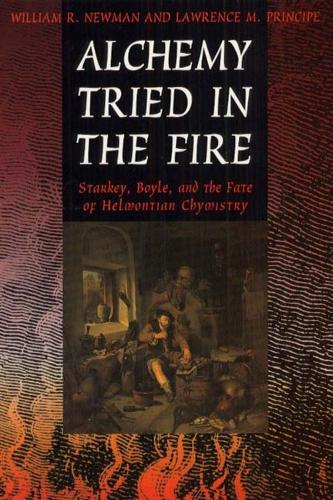Overview
Winner of the 2005 Pfizer Prize from the History of Science Society. What actually took place in the private laboratory of a mid-seventeenth century alchemist? How did he direct his quest after the secrets of Nature? What instruments and theoretical principles did he employ? Using, as their guide, the previously misunderstood interactions between Robert Boyle, widely known as ""the father of chemistry,"" and George Starkey, an alchemist and the most prominent American scientific writer before Benjamin Franklin as their guide, Newman and Principe reveal the hitherto hidden laboratory operations of a famous alchemist and argue that many of the principles and practices characteristic of modern chemistry derive from alchemy. By analyzing Starkey's extraordinary laboratory notebooks, the authors show how this American ""chymist"" translated the wildly figurative writings of traditional alchemy into quantitative, carefully reasoned laboratory practice—and then encoded his own work in allegorical, secretive treatises under the name of Eirenaeus Philalethes. The intriguing ""mystic"" Joan Baptista Van Helmont—a favorite of Starkey, Boyle, and even of Lavoisier—emerges from this study as a surprisingly central figure in seventeenth-century ""chymistry."" A common emphasis on quantification, material production, and analysis/synthesis, the authors argue, illustrates a continuity of goals and practices from late medieval alchemy down to and beyond the Chemical Revolution. For anyone who wants to understand how alchemy was actually practiced during the Scientific Revolution and what it contributed to the development of modern chemistry, Alchemy Tried in the Fire will be a veritable philosopher's stone.
Full Product Details
Author: William R. Newman ,
Lawrence M. Principe
Publisher: The University of Chicago Press
Imprint: University of Chicago Press
Dimensions:
Width: 1.60cm
, Height: 0.30cm
, Length: 2.40cm
Weight: 0.595kg
ISBN: 9780226577111
ISBN 10: 0226577112
Pages: 359
Publication Date: 30 December 2002
Audience:
Professional and scholarly
,
College/higher education
,
Professional and scholarly
,
Professional & Vocational
,
Undergraduate
Format: Hardback
Publisher's Status: Out of Stock Indefinitely
Availability: Awaiting stock

Reviews
Alchemy Tried in the Fire takes us on a fascinating voyage into the laboratory of the seventeenth-century alchemist George Starkey. Two of the most learned and original historians of pre-modern science at work today, Newman and Principe, use the rich evidence preserved in Starkey's notebooks to recreate his practices as a 'chymist' - and the intellectual and technical foundations on which these rested. Their work sheds a powerful light on Starkey's own private science - a rare achievement in any period, and especially before the twentieth century. This is the history of science at its best: erudite, wide-ranging, and convincingly iconoclastic. - Anthony Grafton
"""Alchemy Tried in the Fire takes us on a fascinating voyage into the laboratory of the seventeenth-century alchemist George Starkey. Two of the most learned and original historians of pre-modern science at work today, Newman and Principe, use the rich evidence preserved in Starkey's notebooks to recreate his practices as a 'chymist' - and the intellectual and technical foundations on which these rested. Their work sheds a powerful light on Starkey's own private science - a rare achievement in any period, and especially before the twentieth century. This is the history of science at its best: erudite, wide-ranging, and convincingly iconoclastic."" - Anthony Grafton"
Author Information
William R. Newman is professor of history and philosophy of science at Indiana University. He is the author of The Summa Perfectionis of Pseudo-Geber and Gehennical Fire: The Lives of George Starkey, an American Alchemist in the Scientific Revolution. Lawrence M. Principe is associate professor of the history of science, medicine, and technology and of chemistry at The Johns Hopkins University. He is the author of The Aspiring Adept: Robert Boyle and His Alchemical Quest and coeditor of The Correspondence of Robert Boyle.




